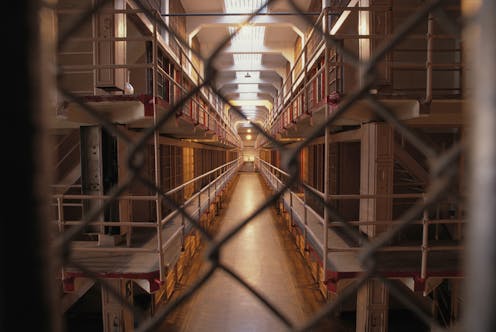Why are there prisons? An expert explains the history of using 'correctional' facilities to punish people
- Written by Joshua Long, Assistant Professor of Criminology and Justice Studies, UMass Lowell

Prison then vs. prison now
In the past, people were not sent to jails and prisons as a legal punishment. Instead, these places were used to contain people[7] who were suspected of a crime, to keep them from escaping before their punishment was decided.
If they were found guilty, sometimes they were punished with physical pain, such as being whipped. Sometimes they were forced to work without pay or for very low wages. Others might be sent far away from their communities and not allowed to come back. The most serious punishment was execution, and many people were killed for their crimes.
Over time, most countries decided that these types of punishment were cruel or ineffective, so they started using jails and prisons[8] as places where people could be punished by losing their freedom for a specific amount of time. Judges could give some people longer sentences if their crimes were more serious, and shorter sentences if their crimes did not deserve a long punishment.
People expected that some prisoners would learn a lesson from their prison experience. If they were scared of going back to prison, hopefully they would be less likely to break the law in the future. Some prisons tried to “rehabilitate” people by giving them an education, job training or therapy that might help them prepare to return home.
Longer sentences
In the 1970s, there was an increase[10] in the number of crimes reported in the United States, and many people were scared. They thought that society would be safer if more people were sent to prison[11]. The size of the prison population increased from around 200,000 people[12] in the 1970s to around 2 million people[13] in recent years.
People started spending very long periods of time in prison, and more people were given life sentences[14], meaning that they could never return home. Before, those punishments had been reserved for very serious crimes, but new laws passed during this time made them more common.
Prisons became overcrowded[15], which spread resources more thinly[16], including programs to help prisoners prepare to return to society. More people wound up committing crimes again[17] after they returned home.
Improving prisons
People who study correctional facilities, like me[18], have found many problems to fix. Some have to do with the large number of people in prisons. Many nondangerous people wind up serving time there[19], when they could serve a different punishment and receive therapy in their communities instead.
Another major problem is racial discrimination[21]. Many researchers have found that Black, Hispanic and Native American people are more likely to be sent to prison[22] than people from other racial and ethnic groups, even if they were convicted of the same crimes. This can cause a lot of serious problems for their families and communities.
Societies might always need to incarcerate some people who have committed serious crimes or who pose a danger to others. Perhaps the system can become safer, fairer and more successful in punishing crimes while rehabilitating.
Hello, curious kids! Do you have a question you’d like an expert to answer? Ask an adult to send your question to CuriousKidsUS@theconversation.com[23]. Please tell us your name, age and the city where you live.
And since curiosity has no age limit – adults, let us know what you’re wondering, too. We won’t be able to answer every question, but we will do our best.
References
- ^ Curious Kids (theconversation.com)
- ^ curiouskidsus@theconversation.com (theconversation.com)
- ^ a criminologist (www.uml.edu)
- ^ a long history (global.oup.com)
- ^ different purposes (www.merriam-webster.com)
- ^ South_agency/E+ via Getty Images (www.gettyimages.com)
- ^ to contain people (daily.jstor.org)
- ^ started using jails and prisons (www.jstor.org)
- ^ Universal History Archive/Universal Images Group via Getty Images (www.gettyimages.com)
- ^ an increase (www.brennancenter.org)
- ^ sent to prison (us.sagepub.com)
- ^ around 200,000 people (www.vera.org)
- ^ around 2 million people (www.prisonpolicy.org)
- ^ life sentences (www.washingtonpost.com)
- ^ became overcrowded (www.prisonpolicy.org)
- ^ spread resources more thinly (heinonline.org)
- ^ committing crimes again (global.oup.com)
- ^ like me (scholar.google.com)
- ^ wind up serving time there (www.brennancenter.org)
- ^ Olivier Chassignole/AFP via Getty Images (www.gettyimages.com)
- ^ racial discrimination (newjimcrow.com)
- ^ more likely to be sent to prison (www.ussc.gov)
- ^ CuriousKidsUS@theconversation.com (theconversation.com)

















